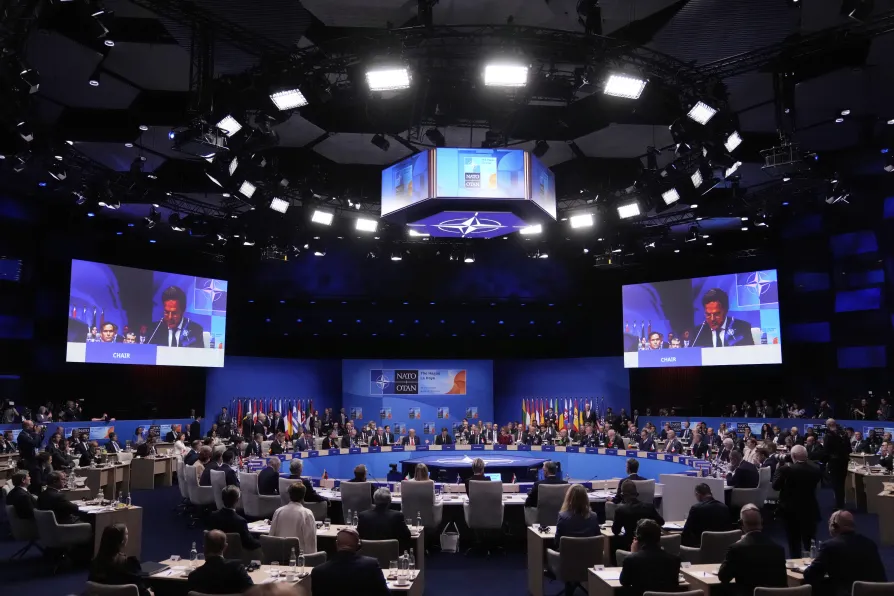KATE CLARK recalls an occasion when the president of the Scottish National Union of Mineworkers might just have saved a Chilean prisoner’s life
MEDEA BENJAMIN argues that real security doesn’t come from tanks and missiles — it comes from strong communities, global co-operation, and urgent action on our shared crises

 NATO heads of state and government meet for a plenary session at the NATO summit in The Hague, Netherlands, June 25, 2025
NATO heads of state and government meet for a plenary session at the NATO summit in The Hague, Netherlands, June 25, 2025
AT LAST week’s Nato summit in The Hague, leaders announced an alarming new goal: push military spending to 5 per cent of nations’ GDP by 2035. Framed as a response to rising global threats, particularly from Russia and terrorism, the declaration was hailed as a historic step. But in truth, it represents a major step backwards — away from addressing the urgent needs of people and the planet, and toward an arms race that will impoverish societies while enriching weapons contractors.
This outrageous 5 per cent spending target didn’t come out of nowhere — it’s the direct result of years of bullying by Donald Trump. During his first term, Trump repeatedly berated Nato members for not spending enough on their militaries, pressuring them to meet a 2 per cent GDP threshold that was already controversial and so excessive that nine Nato countries still fall below that “target.”
Now, with Trump back in the White House, Nato leaders are falling in line, setting a staggering 5 per cent target that even the United States — already spending over $1 trillion a year on its military — doesn’t reach. This is not defence; it’s extortion on a global scale, pushed by a president who views diplomacy as a shakedown and war as good business.
Countries across Europe and North America are already slashing public services and yet they are now expected to funnel even more taxpayer money into war preparation. Currently, no Nato country spends more on the military than on health or education. But if they all hit the new 5 per cent military spending goal, 21 of them would spend more on weapons than on schools.
Spain was one of the few to reject this escalation, with Prime Minister Pedro Sanchez making clear that his government would not sacrifice pensions and social programmes to meet a militarised spending target. Other governments, including Belgium and Slovakia, quietly pushed back too.
Still, Nato leaders pressed on, cheered by secretary-general Mark Rutte, who fawned over Donald Trump’s demand that Europe boost defence spending. Rutte even referred to Trump as “Daddy,” a comment that — while dismissed as a joke — spoke volumes about Nato’s subservience to US militarism. Under Trump’s influence, the alliance is shedding even the pretence of being a defensive pact, embracing instead the language and logic of perpetual war.
Just before Nato leaders were gathering at The Hague, protesters took to the streets under the banner “No to Nato.” And back in their home countries, civic groups are demanding a redirection of resources toward climate justice, healthcare, and peace. Polls show that majorities in the US oppose increased military spending, but Nato is not accountable to the people. It’s accountable to political elites, arms manufacturers, and a cold war logic that sees every global development through the lens of threat and domination.
Nato’s expansion, both in terms of war spending and size — from 12 founding members to 32 countries today — has not brought peace. On the contrary. The alliance’s promise that Ukraine would one day join its ranks was one of the triggers for Russia’s brutal war, and instead of de-escalating, the alliance has doubled down with weapons, not diplomacy. In Gaza, Israel continues its US-backed war with impunity, while Nato nations send more arms and offer no serious push for peace. Now the alliance wants to drain public coffers to sustain these wars indefinitely. Nato is also surrounding its adversaries, particularly Russia, with ever more bases and troops.
All of this demands a radical rethink. As the world burns — literally — Nato is stocking up on kindling. When healthcare systems are crumbling, schools underfunded, and blazing temperatures making large swaths of the planet uninhabitable, the idea that governments should commit billions more to weapons and war is obscene. Real security doesn’t come from tanks and missiles — it comes from strong communities, global co-operation and urgent action on our shared crises.
We need to flip the script. That means cutting military budgets, withdrawing from endless wars, and beginning a serious conversation about dismantling Nato. The alliance, born of the cold war, is now a stumbling block to global peace and an active participant in war-making. Its latest summit only reinforces that reality.
This is not just about Nato’s budget — it’s about our future. Every euro or dollar spent on weapons is one not spent on confronting the climate crisis, lifting people out of poverty or building a peaceful world. For the future of our planet, we must reject Nato and the war economy.
Medea Benjamin is co-author, with David Swanson, of the book Nato: What You Need to Know. This article is republished from peoplesdispatch.org.










